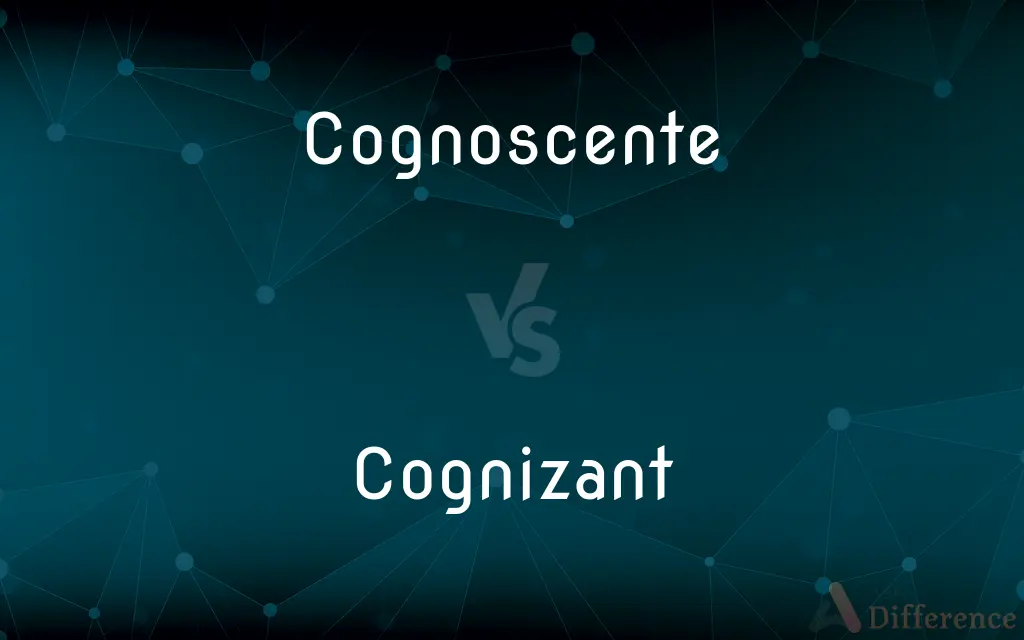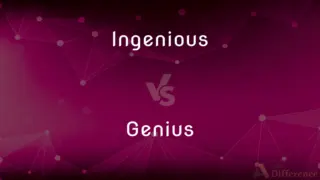Cognoscente vs. Cognizant — What's the Difference?
By Urooj Arif & Maham Liaqat — Updated on February 24, 2024
A cognoscente is someone with expert knowledge or deep understanding in a particular field, related to fine arts or culinary world. While Cognizant refers to being aware of or having knowledge about something, generally applicable in a broader context.

Difference Between Cognoscente and Cognizant
Table of Contents
ADVERTISEMENT
Key Differences
The term cognoscente highlights a level of expertise and refined judgment, usually in areas of art, fashion, or gastronomy, suggesting not just knowledge but a discerning appreciation. It conveys a sense of sophistication and depth in understanding, often acquired through experience and passion. Cognizant, conversely, is about awareness or acknowledgment of facts or situations, without implying depth of understanding or expertise. It's more about being informed or conscious of something, which can apply to any field or context, not limited to areas requiring specialized knowledge.
Cognoscente implies a specialized, often niche expertise, with a connotation of exclusivity and elitism. It's about being an authority or a connoisseur in a specific domain, where one's opinions and insights are highly valued. Cognizant is more universal, focusing on the state of being informed or mindful about something, which can range from everyday matters to complex concepts, without suggesting a profound or specialized understanding.
The distinction also lies in their usage and contexts; cognoscente is used to describe a person with a refined taste and deep knowledge in specific areas, often used in a laudatory sense. Cognizant is used to describe a state of mind or awareness, applicable to individuals or groups, and is neutral, without the connotations of expertise or elitism associated with cognoscente.
In practical terms, a cognoscente might be someone sought after for advice in their area of expertise, such as an art critic or a wine expert, whose knowledge extends beyond the superficial. Being cognizant, however, is a prerequisite for informed decision-making and situational awareness, essential in daily life and professional settings alike, without necessitating specialized knowledge.
Comparison Chart
Meaning
An expert with deep knowledge in a specific area
Being aware or having knowledge of something
ADVERTISEMENT
Connotation
Sophistication, expertise, and refined taste
Awareness and mindfulness
Usage
Describes a person
Describes a state of being
Contexts
Often related to the arts, cuisine, fashion
Broad, applicable in various situations
Implication
Connoisseurship and elitism
General awareness without implying deep expertise
Compare with Definitions
Cognoscente
Known for refined taste and deep understanding.
He is a true cognoscente when it comes to Italian wines.
Cognizant
Being aware of something or having knowledge about it.
You need to be cognizant of the latest industry trends.
Cognoscente
Implies elitism and exclusivity in knowledge.
The cognoscente circle debated the merits of the latest avant-garde exhibition.
Cognizant
Applies to a broad range of awareness.
He remained cognizant of his surroundings even in stressful situations.
Cognoscente
Used in laudatory contexts.
She was recognized as a cognoscente of modernist poetry.
Cognizant
Does not imply specialized expertise.
Being cognizant of basic laws is essential for every citizen.
Cognoscente
An expert in a particular field, especially the arts.
As a cognoscente of Renaissance art, her opinions were highly regarded.
Cognizant
Essential for informed decisions.
The committee was fully cognizant of the potential risks involved.
Cognoscente
Often associated with connoisseurship.
The gallery opening attracted cognoscenti from around the world.
Cognizant
Used to describe a state of mindfulness.
She was always cognizant of her team's feedback.
Cognoscente
A person with superior, usually specialized knowledge or highly refined taste; a connoisseur.
Cognizant
Having cognizance or knowledge. (of).
Cognoscente
Someone possessing superior or specialized knowledge in a particular field.
Cognizant
Cognizant is an American multinational technology company that provides business consulting, information technology and outsourcing services. It is headquartered in Teaneck, New Jersey, United States.
Cognoscente
A connoisseur.
Cognizant
Fully informed; conscious.
Cognizant
(usually followed by `of') having knowledge or understanding;
Our youth are cognizant of the law
I am well aware of his limitations
Common Curiosities
Can anyone be cognizant?
Yes, anyone can be cognizant, as it simply means being aware of or having knowledge about something.
Is cognoscente always related to the arts?
While commonly associated with the arts, cognoscente can refer to expertise in any area, though it often implies a level of sophistication.
How does one become cognizant of an issue?
Becoming cognizant of an issue involves informing oneself, staying aware, and understanding the relevant facts and perspectives.
Does being cognizant imply action?
Being cognizant doesn't necessarily imply action; it's more about awareness, though awareness can inform actions.
Does cognizance require expertise?
No, cognizance doesn't require expertise; it's about being informed or aware, regardless of the depth of knowledge.
What does it mean to be a cognoscente?
Being a cognoscente means having expert knowledge and a refined taste in a specific area, often related to arts or culture.
Is cognoscente a compliment?
Yes, being described as a cognoscente is generally a compliment, highlighting someone's deep knowledge and refined taste.
How does society value cognoscenti?
Society often values cognoscenti for their depth of knowledge and taste, particularly in fields like art, wine, and cuisine.
Can cognizance lead to becoming a cognoscente?
While cognizance is about awareness, it can be the first step toward developing deeper knowledge and possibly becoming a cognoscente in a specific field.
Can a person be both cognoscente and cognizant?
A person can be both, being an expert in a specific field (cognoscente) while also being generally aware (cognizant) of various matters.
Are cognoscente and cognizant interchangeable?
No, they are not interchangeable; cognoscente refers to expertise in a specific area, while cognizant refers to general awareness.
Why is it important to distinguish between being cognizant and a cognoscente?
Distinguishing between the two is important for clarity in communication, as they imply different levels of knowledge and awareness.
What is the importance of being cognizant in the workplace?
Being cognizant in the workplace is crucial for understanding responsibilities, the impact of one's actions, and staying informed about relevant developments.
How do cognoscenti influence trends?
Cognoscenti can significantly influence trends and public opinions in their areas of expertise through their insights and endorsements.
Is there a negative connotation to either term?
Cognoscente can sometimes carry a negative connotation of elitism, while cognizant is generally neutral.
Share Your Discovery

Previous Comparison
Ingenious vs. Genius
Next Comparison
Rapport vs. ReportAuthor Spotlight
Written by
Urooj ArifUrooj is a skilled content writer at Ask Difference, known for her exceptional ability to simplify complex topics into engaging and informative content. With a passion for research and a flair for clear, concise writing, she consistently delivers articles that resonate with our diverse audience.
Co-written by
Maham Liaqat















































